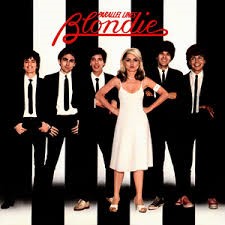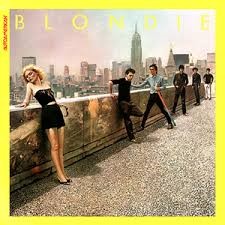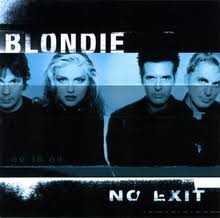- Parallel Lines (1978) – This album is Blondie’s most successful release, featuring hits like “Heart of Glass,” “One Way or Another,” and “Hanging on the Telephone.” It reached number 1 in the UK and 6 on the US Billboard 200, eventually achieving multi-platinum status.
- Eat to the Beat (1979) – Following the success of Parallel Lines, this album includes popular tracks like “Dreaming” and “Atomic.” It also reached the top 20 in the US and the UK, receiving gold and platinum certifications.
- Autoamerican (1980) – Featuring the hits “The Tide Is High” and “Rapture,” this album showcased Blondie’s versatility by incorporating reggae and rap influences. It reached number 7 on the US Billboard 200 and 3 in the UK.
- Plastic Letters (1978) – This album includes the hit single “Denis,” which became a major success in the UK and helped establish Blondie’s international presence. It reached the top 10 in the UK and was certified gold.
- No Exit (1999) – Marking Blondie’s comeback after a 17-year hiatus, this album includes the hit single “Maria,” which topped the charts in the UK. It performed well commercially, reaching the top 20 in several countries and reviving interest in the band’s music.
1. Parallel Lines (1978)

Parallel Lines” (1978) is a rock and new wave music landmark. Released at the height of the punk era, this album showcases Blondie’s versatility and pop sensibilities. With Debbie Harry’s distinctive voice and Chris Stein’s guitar work, “Parallel Lines” catapulted Blondie to international fame. The album features the iconic hit “Heart of Glass,” blending disco with rock, showcasing the band’s ability to innovate and cross genres.
Other standout tracks include “One Way or Another” and “Hanging on the Telephone,” both remain staples in Blondie’s live performances. Produced by Mike Chapman, the album’s polished production contrasts with the raw energy of the punk scene, making it accessible to a broader audience. “Parallel Lines” reached number 1 in the UK and performed strongly in the US, securing Blondie’s place in music history.
2. Eat to the Beat (1979)

“Eat to the Beat” (1979) is a significant release in the rock and new wave genres. Following the massive success of “Parallel Lines,” this album cemented Blondie’s status in the music world. Featuring Debbie Harry’s iconic vocals and the band’s tight musicianship, “Eat to the Beat” includes hits like “Dreaming” and “Atomic.” The album combines rock, punk, and pop elements, showcasing Blondie’s versatility and ability to create catchy, innovative music. Produced by Mike Chapman, the album’s polished sound contrasts with its edgy, punk-inspired lyrics and melodies.
“Eat to the Beat” performed well commercially, reaching the top 20 on the US Billboard 200 and the UK Albums Chart, and achieving gold and platinum certifications. This album is a must-listen for fans of 70s rock, punk, and new wave music, highlighting Blondie’s continued evolution and impact on the music scene.
3. Autoamerican (1980)

“Autoamerican” (1980) moves away from their earlier work, embracing different musical styles. Known for hits like “The Tide Is High” and “Rapture,” the album incorporates reggae, jazz, and hip-hop influences, showcasing Blondie’s innovative approach to rock and new wave music. Debbie Harry’s distinctive voice and Chris Stein’s guitar work are complemented by lush orchestral arrangements, reflecting the band’s ambition to explore new musical territories. Produced by Mike Chapman, “Autoamerican” features polished production and a sophisticated sound.
The album performed well commercially, reaching the top 10 in multiple countries and securing platinum certification. “Rapture,” is notable for being one of the first mainstream songs to feature rap, highlighting Blondie’s role in bridging genres and influencing the evolving music landscape. “Autoamerican” is essential for fans of 80s rock, new wave, and those interested in the fusion of different musical styles.
4. Plastic Letters (1978)

“Plastic Letters” (1978) is a significant release in the rock and punk genres, highlighting the band’s raw energy and catchy melodies. This album features the hit single “Denis,” which became a major success in the UK and helped establish Blondie’s international presence. Debbie Harry’s captivating vocals and Chris Stein’s guitar work drive the album, blending punk attitude with pop sensibilities. “Plastic Letters” showcases Blondie’s ability to craft infectious tunes while maintaining an edgy, underground vibe. Produced by Richard Gottehrer, the album’s sound is polished and gritty, reflecting the band’s growth and confidence.
The success of “Plastic Letters” in the UK marked a pivotal moment in Blondie’s career, setting the stage for their subsequent rise to fame. This album is a must-listen for fans capturing Blondie’s unique sound and spirit during their early years.
5. No Exit (1999)

“No Exit” (1999) marked a triumphant return for the band after a 17-year hiatus. The album features the hit single “Maria,” which topped the UK charts, showcasing Debbie Harry’s enduring vocal prowess and the band’s knack for catchy, memorable tunes. “No Exit” blends Blondie’s signature rock and new wave sound with contemporary influences, demonstrating their ability to evolve while staying true to their roots. Produced by Craig Leon, the album’s polished production highlights the band’s refreshed energy and creativity.
“No Exit” received positive reviews and performed well commercially, reaching the top 20 in several countries. The album reintroduced Blondie to a new generation of fans and reaffirmed their place in the music world. For those interested in the revival of classic bands and the evolution of rock and new wave, “No Exit” is an essential listen, capturing Blondie’s successful comeback and continued relevance.

